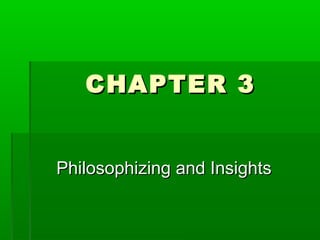
Chapter 3: Philosophizing & Insights
- 1. CHAPTER 3 Philosophizing and Insights
- 2. PHILOSOPHISING Philosophizing present participle of phi·los·o·phize (Verb) 1.Speculate or theorize about fundamental or serious issues, esp. in a tedious or pompous way. 2.Explain or argue (a point or idea) in terms of one's philosophical theories.
- 3. INSIGHT Insight is the understanding of a specific cause and effect in a specific context. The term insight can have several related meanings: a piece of information the act or result of understanding the inner nature of things or of seeing intuitively in Greek called noesis an introspection the power of acute observation and deduction, penetration, discernment, perception called intellection or noesis an understanding of cause and effect based on identification of relationships and behaviors within a model, context, or scenario (see artificial intelligence) An insight that manifests itself suddenly, such as understanding how to solve a difficult problem, is sometimes called by the German word Aha-Erlebnis. The term was coined by the German psychologist and theoretical linguist Karl Bühler. It is also known as an epiphany.
- 4. Philosophizing This is making a quest which as earlier explained results in any of the following: Asking questions, Why does the moon shine at night? Why not during daytime? If this is a question asked by a science teacher to a student in his class, the answer as expected must be a satisfying response based on scientific principle. If the questions comes from an inquisitive little girl the answer must be tactfully phrased so as not to dissuade the child from truth, it merely requires a musing kind of response like it the natural course of things on earth.
- 5. Philosophizing Philosophizing deals with a subject matter using a particular method of response. The philosophical thinker does not even dare to produce anything of practical use but simply to contemplate wisdom. This quest further explains that by philosophizing man’s rational need is answered. Characteristic of Philosophical Questions They have answers which remain unanswered, therefore disputable. Example: What does freedom mean? They cannot be settled by science or common sense. Example: Are lovers really blind? They are of perennial intellectual interest? Example: why does man exist? What does freedom mean when we have no choice, sometimes?
- 6. Philosophizing For philosophizing is a searching for meaning. Why is the moon round? Why do birds fly? Where is heaven, Papa? Why are you crying, Mama? Why are you laughing all by yourself?
- 7. Insight What I am trying to say is that one “sees’ into something more than what meets the eye. It is what philosophers call “insights” Insight men have had ever since they used their intelligence and powers of reflection. The history of philosophy shows that men have seen and noticed things around them, thought and pondered on these, and acted on their reflections.
- 8. Insights pertains to ideas or knowledge derived from different sources. Its kind are: a. Conceptual idea or knowledge means a kind of idea or learning one derives from sharing of minds and experiences or from reading printed materials. It may come as a form of information which consequently becomes an idea. Example: Ordinarily in some meetings or seminar articles or bible passages are read for the participants to get a striking idea in relation to what they heard or derived from the passage. When the answer leads to another query like how does this guide me to the proper direction, then this kind has a philosophical nature. b. Perceptual kind refers to knowledge derived through the senses. In certain cases, during mental exercises, reflection is done with certain instrumental music or an episode presented.
- 9. C. Intuition refers to the learning or knowledge one obtained through feelings independent of the cause. Example to this is one feels he is being cheated by his spouse without any basis but one simply derived unfounded such from feeling. Insights are gained through concept or mere formation of idea while perception is from mere senses and intuition is from mere feeling. These ideas or pieces of information are delivered through the mind, to the sense or to the feeling satisfy three basic factors to constitute learning namely: A. Reasons tell the truth and objectivity of the matter appealing to one’s common sense or judgment. Examples: A father is a male parent the blind cannot see. B. Experience refers to the information or knowledge gained through perception or awareness of mental lives. Examples: One gets hurt being rejected or turned down. A child dislikes to swim because he had an early experience of drowning.
- 10. C. Memory pertains to mental activity of restored ideas. Examples: A child ha a vivid memory of her dead mother. A girl remembers an early childhood memory of a pet.
- 11. Reflection 3 1.What insights do you have with regard to the preparation as a student to the kind of life you want to be and to have? elucidate? (15 pts) 2.How does a philosophical question differ from an ordinary question? (15 pts) 3.How do you define insight and philosophizing? Give examples of each. (20 pts)
